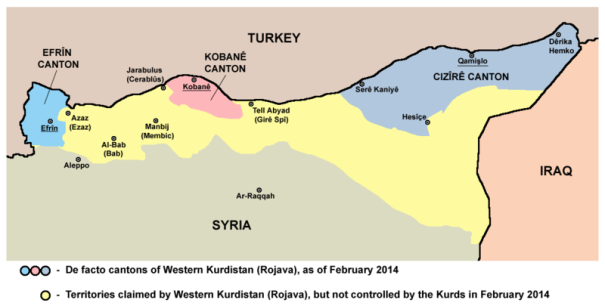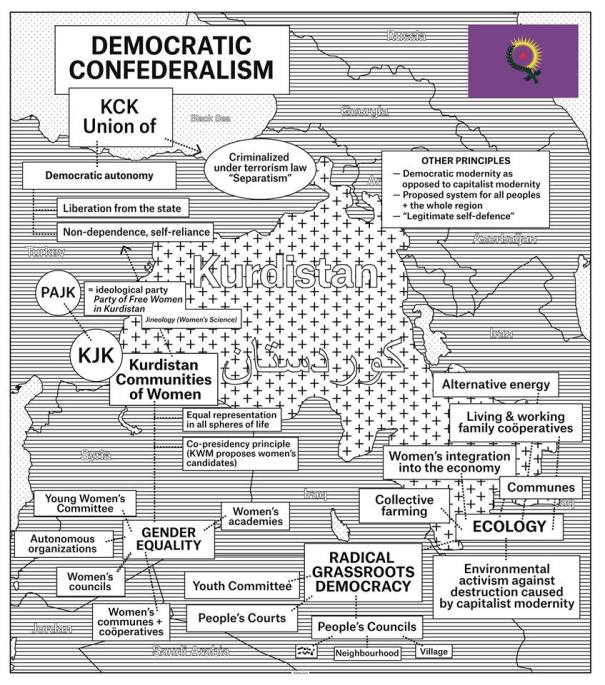What is Rojava?
 Rojava (aka Western Kurdistan or Syrian Kurdistan) is a self-proclaimed autonomous region, containing local communities of Kurds, Yezidis, Arabs, Asyrians and other ethnic/religious groups. Essential for the Autonomy is its secular character, inclusivity for all communities and focus on three cornerstones: Radical feminism, direct democracy and social ecology. The founding document for the Autonomy is its Social Contract, published in January 2014.
Rojava (aka Western Kurdistan or Syrian Kurdistan) is a self-proclaimed autonomous region, containing local communities of Kurds, Yezidis, Arabs, Asyrians and other ethnic/religious groups. Essential for the Autonomy is its secular character, inclusivity for all communities and focus on three cornerstones: Radical feminism, direct democracy and social ecology. The founding document for the Autonomy is its Social Contract, published in January 2014.
Rojava Autonomy claims to be a stateless democracy, aspiring political blueprint for the rest of Middle East, the region haunted by nationalism, religious wars and patriarchate. Still in process of transition, Rojava is apparently heading towards post-nation-state model, trying to face the challenge of failing Westphalian states order.
Currently Rojava suffers heavy damages, being attacked by the Islamic State forces. Heroic – and victorious – defence of Kobane brought Rojava international attention and recognition.
A brief history.
The Autonomy was initiated by the Kurdish movements, rooted in Turkish, PKK-based autonomous structures. The whole story started in 2011, when Abdullah Ocalan, leader of PKK, since 1999 imprisoned in Turkey, published his book on “Democratic Confederalism“. Soon, thanks to his unquestioned leadership, PKK dropped its previous, Marxist ideology, quit aggressive military actions and reformed into autonomy-oriented, more or less peaceful organization (officially only approving use of force in self-defence situations).
Probably the critical change was the empowerment of women. Kurdish women – not only in Turkey – were always fighting together with men. But the PKK ideology made them – on the mandatory basis – equal political actors as well. In no time at all they implemented basic rule: every elected position had to be shared by a man and a woman – the latter being designated by an independent female-only collective. Even as the Turkish law wouldn’t allowed it, under severe sanctions, Kurds put this system in practice on every level, up to the parliamentary representation.
So, when the situation in Syria became ripe enough, setting up the Rojava Autonomy (January 2014) was rather easy – having all basic institutions already tested and running. Newly created political structure soon had to face uninvited attention of powerful enemies: the Islamic State, which was confronted by Kurds in Syria and Iraq before the world even learned about its existence. Between the anvil of Turkish forces, blocking the nearby border and the hammer of ISIL, freshly equipped with heavy weapons, Rojava got forged into unbreakable shield. Tens of thousands civilians had to flee; most of the territory was lost; infrastructure hardly preserved. Still, there were enough people – men and women – left in Kobane to stop theISIL advances and to increase the international awareness of the problem.
In the spotlight of history.
As I write these words, it is over 100 days of unrivalred, stubborn and efficient resistance of Kobane. Over this time we witnessed several changes in the international awareness and stance – and I do not mean only governments, but also so called “public opinion”.
Initially, the “Anty ISIS coalition” was simply ignoring Rojava. Just another tribal community, doomed from the beginning. Another example that nobody in the Middle East can survive without the umbrella provided by the US&Co. Powers that be were holding back their reaction until the IS steamroller crushes Rojava and reach the Turkish border. The “public opinon”, cut off the information from the area, knew nothing and largely paid no attention.
Surprisingly, the steamroller lost its traction. Most of the Rojava was destroyed, people fled to avoid beheading, rape or slavery. The point of resistance, however, appeared to be in Kobane (aka Kobani, Ayn-al-Arab). Central of three Rojava cantons, less than kilometre from the Turkish border, Kobane started getting attention of the humanity.
One of the most important aspects of Rojava Autonomy is its feminist foundation. Not only – as it is normal for Kurds – women make up about 30% of the regular (YPK) Kurdish army and have also formed their own 100%-female army (YPJ). Apart from giving support to the rest of women’s movement, it has an unexpected twist regarding the Islamic State. Being killed by a woman supposedly denies an IS warrior any chance to get to heaven (which I personally enjoy immensely). It is surely one of problems IS did not expect in their planning. One which probably helped a lot to hold Kobane during the siege, as roughly half of defenders are female there.
“Lyonesses of Kobane” were the first to get attention from the international audience. Gradually, the picture became more complete. We started learning about details; unique elements of Rojava political system; the dubious game played by Turkish government, hoping IS to squash Kurdish attempt to build stable structures in Syria; declared support from the anti-IS coalition, not followed by actual help. Thanks to thousands of volunteers, coordinating their efforts online, the word got spread. There was a moment of international mobilization, which forced governments to start acting according to their declarations. US, UK and Australian air raids started hitting IS around Kobane. Some weapon got air-dropped. Some pressure was put upon Turkey to stop supporting IS so visibly. Eventually, a contingent of Iraqi Kurdistan Peshmerga was permitted to cross Turkish territory to join Kobane defenders.
Fights continued, but it became clear that – save for some really unexpected twist of action – IS lost Kobane and most probably the whole Rojava. Political necessity and somewhat sentimental perception of “the international community” combined into a favourable weather for Rojava. At least for the time being.
Right this moment.
There is more to do in Rojava than to sweep the IS beyond the horizon. Much less spectacular work is to restore the whole Autonomy structure. To bring people back from refugee camps in Turkey. To feed them. To provide shelter, water, electricity, heating. Re-establish social and political structures. Get back to normal life.
The initial step in this direction was the appeal issued by Rojava authorities on December 2d. It summarises the basic needs and outlines steps to be taken to help Kobane recover. Soon it was backed with a publication by Carl Drott, Swedish journalist and researcher.
It was a clear signal that the people of Rojava had begun planning beyond immediate survival. It means they are not going to be just one-time popular exotic heroes. They stick with their ideals and they keep building a society that goes against the “official” political doctrine. It makes situation complicated, as Rojava is highly disruptive and the Middle East is still a playground of powers which do not really accept disruption – except for the one they deliver.
So, for last few weeks we have seen a growing campaign to make Rojava vanish from the spotlights of international audience, to get it marginalised politically and supposedly to never let it reappear as an independent political entity.
Who wants Rojava to vanish?
We should keep in mind that the political concept for Rojava: stateless autonomy, based on feminism, ecology and local, direct democracy, is highly dangerous to the official political doctrine – not just in the Middle East. Democratic Confederalism is clearly designed as an exemplary solution, to be spread, cloned and scaled throughout the region. But, as we see from the EZLN experience, it can be applied everywhere. Especially in the Global South countries, but also in destabilised areas near old colonial metropolies; in Greece, Balkans, Portugal and Spain there are strong movements toward autonomy. They are normally labelled as nationalistic, which is standard way to ban them from regular political discourse. Rojava is not nationalist, it is highly democratic and inclusive system. In fact, Rojava became a safe harbour for all minorities: religious, ethnic and social, endangered by the traditional, patriarchal and fundamentalist environment of Syria, Turkey and Iraq. It is also strongly anticapitalist. And it works.
This make the Rojava system an attractive alternative to the nation-state model for all freedom-oriented and/or left-wing movements, hoping to ‘jailbreak’ the TINA paradigm, imposed by traditional capitalist state.
The list of Rojava adversaries is quite impressive.
Turkey is deeply afraid that Rojava may become a stronghold of PKK-related autonomists, providing human, material and psychological support to the Kurdish movement in Turkey. At the same time Turkey sees it as an obstacle for their plans to expand into the Syrian territory.
All other states inhabited by Kurds – Iran, Iraq and Syria – will be deeply unhappy if such bad apple as Rojava start spoiling the whole metaphorical barrel.
The list goes further, including major actors of the Middle Eastern scene – USA, UK, Israel and Arab countries. Since the infamous Picot-Sykes agreement their whole game is founded upon ancient “divide and impera” rule, where elusive lure of “your own state” is used to convert frustrated communities into terrorist proxy wars cannon fodder – exactly as it happened with ISIL. If Rojava succeeds, it would disarm the whole Middle East minefield, effectively forcing major change of global geopolitics.
Unfortunately, one of actors here is also KRG – the government of Iraqi Kurdistan. It is an aspiring nation-state, built upon heavy support from the USA (and recently Israel as well), highly westernized, patriarchal and openly nationalistic. The economy is based upon oil and gas from ex-Iraqi fields. Armed forces – Peshmerga – are supplied and trained by the US-led NATO coalition. Over last few weeks KRG has apparently been designated to be the token of Kurdish cause for the world. Peshmerga, freshly supported with heavy equipment, actively confronted ISIS, with significant successes. International media publications quit talking about YPG, YPJ, and Rojava – now they promote “Kurdistan” and Peshmerga instead. “We all are Peshmerga” is a slogan of the day. Social networks are full of appeals to keep unity of Kurds – under Peshmerga and Iraq Kurdistan colors. KRG leaders strongly reject any suggestion that Rojava may be something else than a future part of Kurdistan. From one week to another, international “public opinion” got refocused from the Kobane defence to the blooming “Great Kurdistan”: new regional actor, trusted ally of the USA and always-been-a-friend friend of Izrael. Rojava sort of got back into the woodwork.
On the Kurdish level, Rojava is on the verge of being accused of breaking a saint Kurdish unity – with the whole traditional rhetoric of “Whom it serves” etc. It is quite probable that the Rojava’s autonomy may not survive, if it joins the soon-expected-to-emerge Kurdish state.
Who needs Rojava?
So, is there ANYBODY who needs Rojava? Except for its dwellers, maybe?
Globally speaking, we all need it, as much as we need to stop the western colonisation of Middle East. But there are also other reasons.
As we experience major dysfunction of global capitalism and westfalian states, more and more people started looking for a sustainable and resilient alternatives. There is a number of solutions already tested in the area of economy, technology and small-scale communities. However, Rojava is the first in our part of the world (second only to EZLN) long lasting test of a stateless democracy. Test, mind it, run in an extremely unfavourable environment. So, in the best interest of everyone who wants to live off the political grid is to support Rojava. Not to speak about “ordinary” solidarity with the people who not only confronted the biggest menace on the Middle East, but also succeeded in this confrontation. We already see it can be done. Now, we need to learn how.
Rojava gives us highly encouraging examples of practical feminism, local democracy, inclusive society and efficient resistance against anyone trying to destroy their society. We should support them and we should learn from them. But first of all – we cannot let Rojava perish!
What can WE do?
There are many people (most of them luckily unknown to the public) who struggle daily to upkeep military effort of YPJ, YPG and their allies. Massive grass-root movement brought awareness, solidarity and finally official support for defenders of Kobane. Now, there is even bigger challenge. Whoever of us claims to support the cause of freedom, democracy or feminism, should join similar effort to help Rojava recover from the war and get back to life.
Help now!
There is a number of initiatives throughout Europe and North America, gathering money and goods to send to Rojava. Find the one that is closest to you; check if it really helps Rojava (if they are connected with Kurdish structures in Turkey, it is most probably the case); get involved in their actions. And spread the word – offline and online. Despite all its flaws, Facebook still seems to be the best environment for it (remember not to put ANY sensitive information there!).
International Peace Brigades
Humanitarian help is a short term solution. If we want (and we do want!) Rojava thriving, we need to build vast network of supporters and volunteers. Let us create and run an international volunteering program to bring volunteers to Rojava, as soon as the direct threat is over! They need qualified and unqualified volunteers. They need people to transfer knowledge. They need visible and practical support from us – especially from us Europens. Kobane stopped ISIS in their advance towards Europe – and the values they defend are our values as well. While we have a lot to share – technologies, agriculture, our energy – there is also a lot of things we may learn; namely: how to create, maintain and defend a just, democratic and inclusive society. Against all odds.
We need Rojava – Rojava needs us. So, let’s start forming International Peace Brigades for Rojava NOW. It is time to move on. Revolution will not happen by itself!
Recommended resources:
- Kurdish Organisations (Wikipedia)
- Murray Bookchin: Libertarian Municipalism (Wikipedia)
- Abdullah Ocalan book.
- My commentary: Democratic Confederalism, political blueprint for the Stateless Democracy.
- Rojava Autonomy Social Contract.
- Siege of Kobane in Wikipedia
Dilar Dirik: “How Kurdish Women saved democracy from the State”
Political map of Rojava, women’s point of view.
- P2P Foundation on Rojava Autonomy
- Norwegian New Compass on Rojava Autonomy.
- The new PKK: unleashing a social revolution in Kurdistan (Roar Magazine)
- Dilar Dirik: Şengal: Islamic State, Kurdish (In)dependence, Western hypocrisy, and the failure of the nation-state paradigm (The Kurdish Question)
- OpenDemocracy: Oil politics and the battle of Kobane.
- Gatestone Institute (USA): Kurdistan: More Like Israel, Less Like Iraq
- David Graeber: “No. This is a Genuine Revolution” (ZNet)
- HAWAR – Rojava news agency.
- First salvo: Barzani slams remarks of Turkey’s Kurdish HDP leader, senior PKK member over Sinjar.
- Different View: Kurdish Sinjar offensive too late for some Yazidis (Al-monitor)
…and the comment by Dilar Dirik:
“This article resonates with my own observations from talking to Yezidis, who have fled from Shengal (Sinjar) to other parts of the KRG or Rojava. Although the last Sinjar operation was vital and crucial, the KRG, specifically the KDP, have a lot to make up to the Yezidis. The Yezidis at the Newroz Camp in Dêrîk (Rojava) that we spoke to almost cursed the KDP for abandoning them in Sinjar in August, as well as all the institutions, who are supposed to provide aid like the UN and all the states that instrumentalize the tragedy of Sinjar for their policies without actually caring one bit about them. Many refugees told us that the KRG is exploiting the misery of the Yezidis to demand aid which never actually reaches them. In Duhok, we saw with our own eyes how, next to luxurious villas, entire families were struggling to survive the winter inside unfinished buildings under construction without walls, blankets, and basic needs. The Yezidis are sick and tired of people coming to take photos for show, only to abandon them again.
Even if August is in the past now, even if Kurdish forces jointly liberate Sinjar now, the KRG is still upholding the embargo on Rojava which means that no humanitarian aid, including blankets and food, reaches the people there. If the KRG can sell oil independent of the central Iraqi government, why not transport basic needs to the refugees across the tiny bridge that forms an artificial border to Rojava? The aid comes from abroad anyways, all that the KRG officials need to do is to let it cross. The embargo is suffocating Rojava, which hosts ten thousands of refugees, including thousands of Yezidis from Sinjar – and the people are very much aware of the KRG’s role.
Similar to what this article says, Yezidis at the Newroz camp told us “YPG/YPJ and the PKK did everything for us, while the KRG abandoned us. If ISIS didn’t kill us, the embargo is killing us now.” Some even said that they are being threatened and therefore cannot go to the KRG, because they spoke the truth.
Speak about “Kurdish unity” all you want, but – with all due respect to those who participated in liberating Sinjar – if the KRG continues these hostile policies, the wounds of the Yezidis will remain unhealed forever.“
Feel free to add your recommendations in the comment field below.



[…] By no means this is a professional analysis. However, I believe, there is a great deal of things that can be done based upon even simplest observations. I will be focusing on European context which I know the best. As a preliminary reading I recommend my article https://freelab2014.wordpress.com/2014/12/29/is-rojava-written-off/ […]
[…] above video is embedded in the article Is Rojava written off? Dilar Dirik's blog. Dilar Dirik's Facebook page. Some articles by Dilar Dirik Kurdish Women’s […]